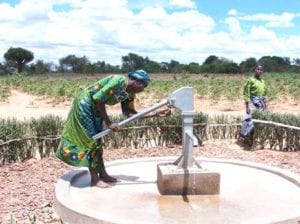The South African government is currently deploying many efforts towards employment creation through massive infrastructure development projects.
Employment creation also figures high in water programmes, such as the Working for Water and the River Health programme. However, these programmes are all rather top-down and very specialised. It is increasingly realised that there should be more community-driven projects in collaboration with local government. These challenges and possible solutions were highly debated during the launch of the Water Research Commission’s (WRC) Water Currents Policy Series, on 14 August 2012. The launch attracted over 150 registered delegates and provided an opportunity to bridge the gaps between scientists, water users, policymakers, senior programme managers and implementers – particularly on one of the most pertinent topics of today – job creation. “We intend the dialogues to be a solution-oriented discussion to address our challenges. We have a rich repository of smart people in our science and technology system, who need to be tapped into to apply their research capability beyond the laboratory,” stated WRC CEO, Dhesigen Naidoo, during the opening address. According to a leading expert on inequality and economic marginalisation in Trade and Industrial Policy Strategies , a policy research NGO, the time has come for South Africa to use public employment to respond to water-related challenges at community level; raise awareness of the scope and opportunity to do so while also building partnerships. The opportunity does exist in the South African context to use labour to address social challenges at the local level through the Community Work Programme (CWP) with the large number of unemployed being viewed as an untapped resource. However, this requires a participatory process, which is the essential logic of the local CWP.The international speaker, Shilp Verma of International Water Management Institute (IWMI), India provided a fascinating account of Mahatma Gandhi’s National Rural Employment Guarantee Act (2005) which aims at enhancing the livelihood security of people in rural areas by guaranteeing hundred days of wage-employment in a financial year to a rural household whose adult members volunteer to do unskilled manual work.But despite the advantages of an employment guarantee, Verma conceded that a well-implemented public works programme should, over time, crowd itself out. This needs to be internalised in performance assessment and long-term planning accompanied with transparency and accountability that is built into the project design.
“South Africa should start looking at using innovative robust and scalable methodologies for community-driven water development, linked to municipalities’ Intergrated Development Plans, with solutions for inclusive planning, informed technology choice and democratic accountability,” says Barbara van Koppen, a new board member of the WRC. Among the delegates was the well-known rural development activist from Cullinan, Mma Tshepo Khumbane who echoed her sentiment, “I have served in many government planning structures and have been saying one thing – that the top-down approach does not work for village projects; if you want to see change involve the villagers from the beginning”. In her closing summary, the WRC research manager, Inga Jacobs, gave emphasis to the key points that were highlighted by the dialogue, which included public awareness as a key driver to the sustainability of environmental interventions. The dialogue revealed that a lot could be achieved through cross-sectoral collaboration and joint resource mobilisation for implementation and action research. It shows that public employment is NOT the silver bullet despite the advantages of employment guarantees– there is a desperate need to address the structural (social and economic) issues at play. This means that the time is gone for regarding communities as experiments – they are pioneers!






